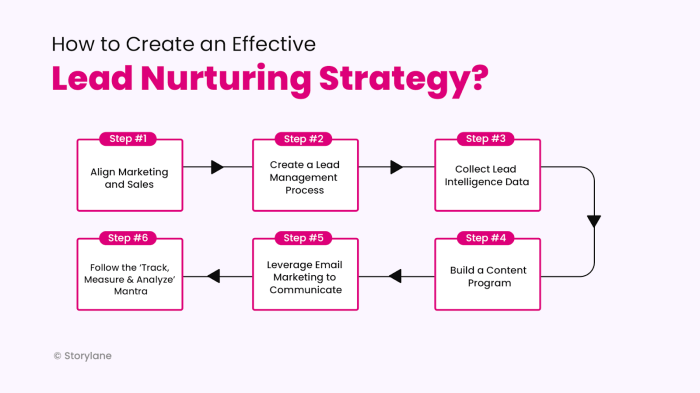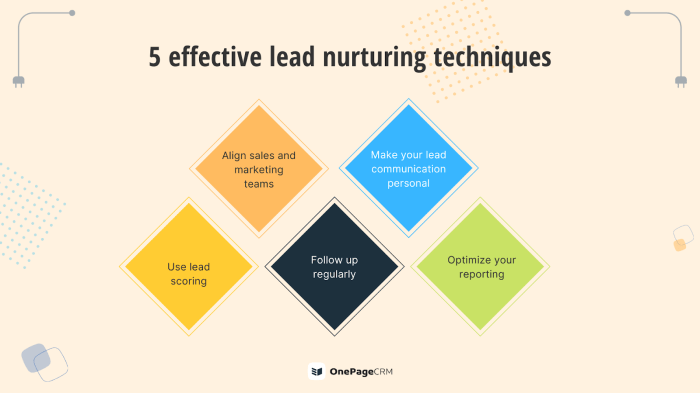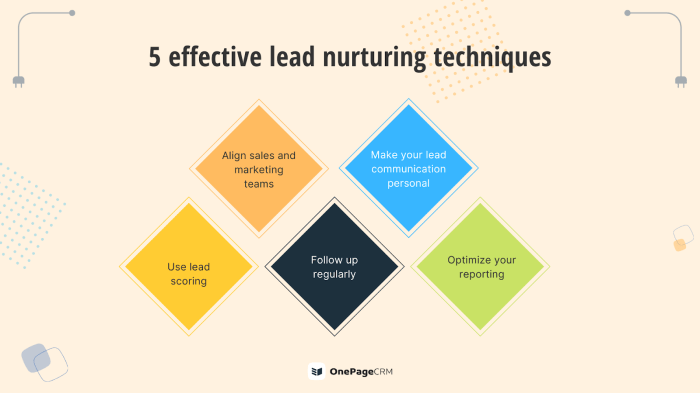Lead Nurturing Techniques takes center stage with a vibe that’s all about building solid connections and fostering customer loyalty. Get ready to dive into the world of modern marketing strategies that are sure to keep your audience hooked.
Let’s explore the ins and outs of lead nurturing, from personalized communication to effective strategies used by top businesses today.
Lead Nurturing Techniques
Lead nurturing in marketing refers to the process of building relationships with potential customers at every stage of the sales funnel. The goal is to guide them through the buyer’s journey, providing them with relevant information and content to ultimately convert them into paying customers.
Examples of Effective Lead Nurturing Techniques
- Personalized Email Campaigns: Sending targeted emails based on the recipient’s behavior and interactions with the brand can help nurture leads effectively.
- Content Marketing: Providing valuable and educational content through blogs, videos, and social media can keep leads engaged and informed.
- Lead Scoring: Assigning scores to leads based on their actions and engagement level can help prioritize follow-up efforts and tailor communication accordingly.
- Marketing Automation: Using automation tools to send timely and personalized messages to leads based on their behavior can streamline the nurturing process.
The Importance of Personalized Communication in Lead Nurturing Strategies
Personalized communication is crucial in lead nurturing as it helps build trust and credibility with potential customers. By tailoring messages and content to the specific needs and interests of each lead, businesses can create more meaningful interactions and increase the likelihood of conversion. Personalization shows that the brand cares about the individual customer, leading to stronger relationships and higher engagement levels.
Email Marketing
Email marketing is a crucial aspect of lead nurturing as it allows businesses to stay connected with potential customers, providing them with valuable information and updates to guide them through the sales funnel.
Key Elements for Successful Email Marketing Campaign, Lead Nurturing Techniques
Successful email marketing campaigns for lead nurturing require a combination of key elements:
- Personalization: Tailoring emails to individual recipients based on their preferences and behavior.
- Relevance: Ensuring that the content of the emails is valuable and applicable to the recipient’s needs.
- Consistency: Sending emails regularly to maintain engagement and build trust with leads.
- Clear Call-to-Action: Including a clear and compelling call-to-action to prompt leads to take the desired action.
- Analytics: Monitoring and analyzing email performance metrics to optimize future campaigns.
Types of Email Content for Lead Nurturing
When it comes to lead nurturing, different types of email content can be used to effectively engage with leads:
- Educational Content: Providing valuable information, tips, and resources to educate leads about your products or services.
- Promotional Content: Offering discounts, promotions, or special offers to incentivize leads to make a purchase.
- Personalized Content: Tailoring emails to individual leads based on their interests, preferences, and past interactions with your brand.
Social Media Engagement: Lead Nurturing Techniques

Social media platforms play a crucial role in lead nurturing by providing a direct channel for engaging with potential customers. Through strategic use of social media, businesses can build relationships, establish trust, and guide leads through the sales funnel.
Utilizing Social Media for Lead Nurturing
- Regularly post valuable content that addresses the pain points and interests of your target audience.
- Interact with leads through comments, direct messages, and personalized responses to inquiries.
- Use social media advertising to target specific demographics and retarget leads who have shown interest in your products or services.
Engaging with Leads on Social Media
- Encourage two-way communication by asking questions, conducting polls, and hosting live Q&A sessions.
- Share user-generated content to showcase customer experiences and build social proof.
- Offer exclusive promotions or discounts to your social media followers to incentivize engagement and conversions.
Role of Social Listening
- Monitor conversations and mentions of your brand to gain insights into leads’ needs, preferences, and pain points.
- Identify trends and sentiment around your industry to tailor your content and messaging accordingly.
- Use social listening tools to track s, hashtags, and competitor activity for a comprehensive understanding of the market landscape.
Content Marketing

Content marketing plays a crucial role in lead nurturing efforts by providing valuable and relevant information to potential customers at different stages of the buyer’s journey. By creating and distributing content that addresses the needs and pain points of leads, businesses can build trust, establish authority, and ultimately guide leads towards making a purchase decision.
Types of Content for Nurturing Leads
- Blogs: Regularly updating a blog with informative and educational content can help attract and engage leads. Blogs can address common questions, provide solutions to problems, and showcase thought leadership in the industry.
- Videos: Visual content like videos is highly engaging and can effectively convey complex information in a digestible format. Product demos, customer testimonials, and explainer videos can all be used to nurture leads.
- Webinars: Hosting webinars allows businesses to interact with leads in real-time, provide in-depth knowledge on specific topics, and answer questions. Webinars can be a powerful tool for nurturing leads and moving them closer to conversion.
Importance of Valuable and Relevant Content
Creating valuable and relevant content is essential for engaging leads and nurturing them towards a purchase decision. When content addresses the specific needs and challenges of leads, it demonstrates an understanding of their pain points and builds credibility for the business. By consistently providing high-quality content, businesses can establish themselves as trusted advisors in the eyes of their leads, increasing the likelihood of conversion.
